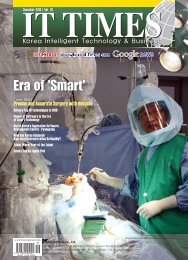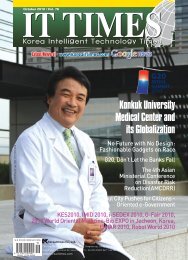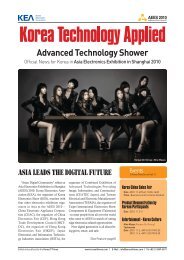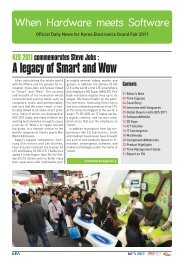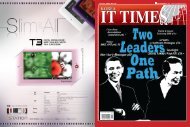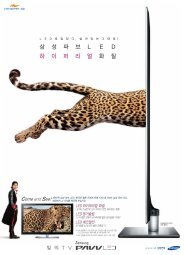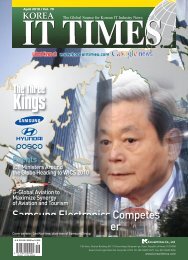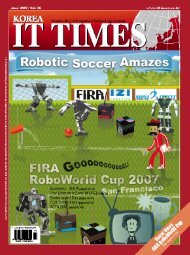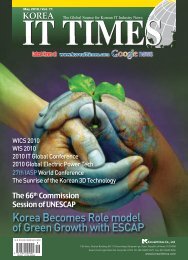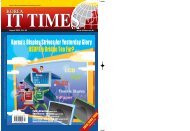Konkuk University Medical Center and its ... - Korea IT Times
Konkuk University Medical Center and its ... - Korea IT Times
Konkuk University Medical Center and its ... - Korea IT Times
Create successful ePaper yourself
Turn your PDF publications into a flip-book with our unique Google optimized e-Paper software.
Event<br />
ing research papers that will be presented during the event. He also<br />
eluded to some stunning artistic exhibitions.<br />
Unfortunately, he left us hanging in suspense with his next<br />
comment. "We have also recently received a request to participate<br />
by a company which shall remain nameless at this point.<br />
They contacted us <strong>and</strong> said that they wanted to do a presentation<br />
of their work, but they did not want to release details of the product<br />
prior to the demonstration, due to concerns that the exposure<br />
might compromise their proprietary interest. They provided<br />
enough information to peak our interest <strong>and</strong> we decided to include<br />
them in the event. We're very excited to learn more about<br />
the research <strong>and</strong> development that they have been doing <strong>and</strong> see<br />
what they've come up with."<br />
AR improves our daily lives<br />
The ISMAR 2010 website says "Mixed Reality (MR) <strong>and</strong><br />
Augmented Reality (AR) allow the creation of fascinating new<br />
types of user interfaces, <strong>and</strong> are beginning to show significant impact<br />
on industry <strong>and</strong> society." We asked Professor Kim to tell us<br />
about how this technology effects our daily lives. We told him<br />
that we were familiar with the use of AR for generating images on<br />
TV screens during sporting events <strong>and</strong> asked if he could provide<br />
some other examples. He responded by saying "When I think<br />
about the AR that you are talking about, I think of a lot of preproduction<br />
work that goes into making that happen. Cameras<br />
have to be set in specific locations, graphics need to be created<br />
<strong>and</strong> staged in advance; the stage has to be set for it to happen."<br />
"What I was thinking about was AR capable Smart Phones.<br />
The GPS enabled phone can triangulate your location <strong>and</strong> the internal<br />
compass can tell which way you are facing. As you point<br />
the phone at a building directly in front of you the camera collects<br />
an image. The AR technology can access a database of images<br />
<strong>and</strong> is able to identify the building characteristics from the image.<br />
Then the application serves up the address <strong>and</strong> information about<br />
the businesses in the building. I actually used that technology on<br />
my way here to meet with you in this building. This is an example<br />
of how this technology make our lives easier." he continued.<br />
Kim shared another thought on the subject when he said "One<br />
idea that I have envisioned for many years is that of using this<br />
technology in an educational setting. Imagine a High School<br />
chemistry class. Keeping most students attention is difficult unless<br />
the experiment involves blowing something up. Lets say they<br />
have real-world lab apparatus, test tubes, microscopes <strong>and</strong> the<br />
like. What if they could virtually combine those elements which<br />
normally result in an explosion in their real world setting <strong>and</strong> they<br />
get information about the reaction without anything blowing up.<br />
I think they would be more engaged <strong>and</strong> have a better learning<br />
experience." "Students can have that experience in a purely virtual<br />
world. Computer graphics in games get better with every new<br />
edition, but virtual reality is still virtual. There is a phenomenon<br />
which has been documented, that shows that when a person is<br />
engaged in a pleasurable virtual activity their interest will start at a<br />
normal level <strong>and</strong> rise during the initial period. After a time<br />
though, the interest level peaks <strong>and</strong> is followed by a rapid decline.<br />
In other words it's fun for a while, but it doesn't take long before<br />
the thrill is gone. I think by augmenting reality, as opposed to creating<br />
virtual reality, the user will remain engaged for a longer period<br />
of time <strong>and</strong> have a better experience."<br />
Arts, Media <strong>and</strong> Humanities program<br />
One element of the ISMAR 2010 event is the Arts, Media <strong>and</strong><br />
Humanities program (AMH). Professor Kim said that this is a<br />
feature of the event was resurrected by the organizers of ISMAR<br />
2009 in Orl<strong>and</strong>o, Florida in the US. "We agreed with the IEEE<br />
that it should continue this year. It was one of the more difficult<br />
parts of organizing the event, because we had to reach out to<br />
Artists <strong>and</strong> Social Scientist <strong>and</strong> try to engage them for the event.<br />
Fortunately, my Co-Chair, Heedong Ko of the <strong>Korea</strong> Institute of<br />
Science <strong>and</strong> Technology had some contacts in those communities<br />
<strong>and</strong> he was able to arrange for their participation."<br />
Why <strong>Korea</strong> for the ISMAR 2010?<br />
We were curious why the event was being held in <strong>Korea</strong> this<br />
year. Professor Kim cleared up that question by saying "As I said<br />
before, in the past when the event came to Asia, it was held in<br />
Japan. Today, the AR research community in <strong>Korea</strong> has reached<br />
a critical mass. Samsung <strong>and</strong> LG have been working hard to integrate<br />
AR functionality in to their phones. Now, we are big<br />
enough contributors to the community to have our bid taken seriously.<br />
Had we tried to make it happen seven or eight years ago, I<br />
don't think it would have succeeded."<br />
Can the general public attend?<br />
We thought there might be some interest in the information being<br />
presented at the event for the general public. We wondered if<br />
there was room for general public participation at the event.<br />
Professor Kim said that he had hope that the general public<br />
would be able to attend when he assumed a leadership role in the<br />
symposium, because there would certainly be some interesting<br />
things to see, including art exhib<strong>its</strong> <strong>and</strong> demonstrations of the<br />
technology for the lay person. They planned the event for 400 attendees<br />
based on limitations of the venue. As it turned out, the<br />
projected number has been reached. Professor Kim said "If your<br />
readers are unable to attend the event, then I suggest that they visit<br />
the ISMAR 2010 web site for a post-event recap of the event activities.<br />
We are always looking for ways to interact with the general<br />
public to spread the word about what we are doing <strong>and</strong> get<br />
feedback regarding their AR experiences."<br />
Robert E. Weimer / bob@koreaittimes.com<br />
www.koreaittimes.com 81



